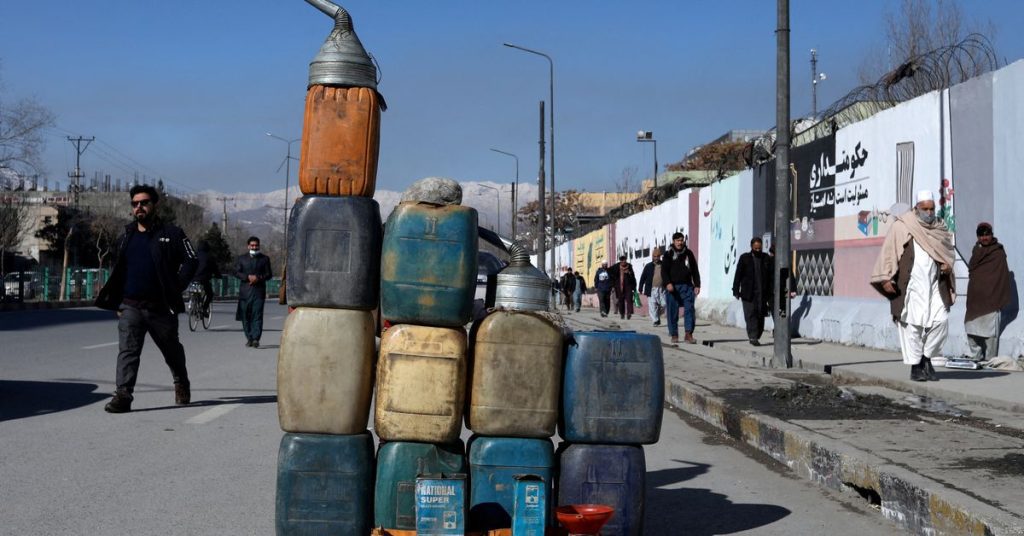KABUL (Reuters) – Afghan Trade and Industry Minister Haji Noordin Azizi told Reuters the Taliban had signed an interim agreement with Russia to supply gasoline, diesel, gas and wheat to Afghanistan.
Azizi said his ministry is working to diversify its trading partners and that Russia has offered the Taliban administration a discount on average global commodity prices.
The move, the first major international economic deal the Taliban has struck since its return to power more than a year ago, could help ease the Islamist movement’s isolation that has effectively cut it off from the global banking system.
Register now to get free unlimited access to Reuters.com
No country officially recognizes the group, which fought a 20-year insurgency against Western forces and their local Afghan allies before overrunning Kabul with the withdrawal of US forces.
Western diplomats said the group needed to change its course on human rights, particularly women’s rights, and prove that it had cut ties with international militant groups in order to gain official recognition.
Russia does not officially recognize the Taliban government, but Moscow hosted the movement’s leaders in the run-up to the fall of Kabul, and its embassy is one of the few remaining open in the Afghan capital.
Azizi said that the deal includes the supply to Russia of about one million tons of gasoline, one million tons of diesel, 500,000 tons of liquefied petroleum gas and two million tons of wheat annually.
Russia’s energy and agriculture ministries did not immediately respond to requests for comment on the agreement. The office of Russian Deputy Prime Minister Alexander Novak, who is in charge of oil and gas, also did not immediately respond.
Azizi said the agreement will run for an indefinite trial period, after which the two sides are expected to sign a long-term agreement if they are satisfied with the arrangement.
He declined to give details on prices or payment methods, but said Russia had agreed to a discount to global markets on goods to be delivered to Afghanistan by road and rail.
The deal was finalized after an Afghan technical team spent several weeks in discussions in Moscow, having visited Azizi there last month.
The economy is in crisis
Since the Taliban regained power, Afghanistan has plunged into an economic crisis after cutting off development aid on which the country depends and amid sanctions that have largely frozen the banking sector.
The trade deal is likely to be closely watched in the United States, whose officials have held regular talks with the Taliban about plans for the country’s banking system.
Washington announced the creation of a Swiss trust fund for some of the Central Bank of Afghanistan reserves held in the United States. The Taliban demanded the release of the full amount of about $7 billion and said the money should be used for the operations of the central bank.
Azizi said international data showed that most Afghans live below the poverty line, and his office is working to support trade and the economy through international outreach.
“Afghans are in dire need,” he said. “Whatever we do, we do it out of the national interest and the interest of the people.”
He said Afghanistan has also received some gas and oil from Iran and Turkmenistan and has strong trade ties with Pakistan, but it also wants to diversify.
“A country should not depend on just one country, we should have alternative methods,” he said.
The Group of Seven (G7) is trying to find ways to reduce Russia’s oil export earnings in the wake of its invasion of Ukraine in February.
Moscow was able to maintain revenue by increasing sales of crude oil to Asia, especially China and India. The European Union is due to ban imports of Russian crude by Dec. 5 and Russian oil products by Feb. 5.
Register now to get free unlimited access to Reuters.com
(Reporting: Charlotte Greenfield and Muhammad Yunus Yawar). Editing by Mike Collette White and Jane Merriman
Our criteria: Thomson Reuters Trust Principles.

“Unapologetic tv specialist. Hardcore zombie trailblazer. Infuriatingly humble problem solver.”







More Stories
Stand News editors convicted in sedition case
Latest Baysail sinking: Mike Lynch’s wife ‘didn’t want to leave boat without family’ as crew investigated
WFP halts Gaza operations after repeated shooting at aid vehicle